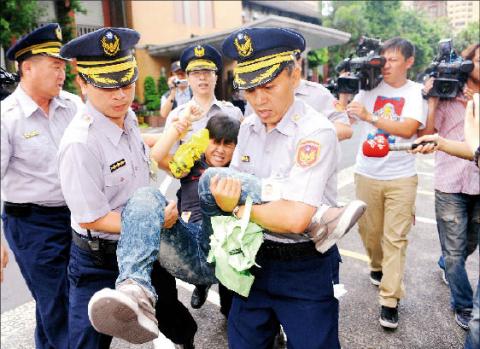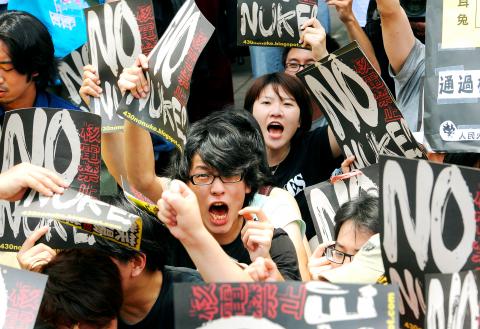The legislature yesterday voted down a set of anti-nuclear motions proposed by the Democratic Progressive Party (DPP).
Holding just one-third of the legislative seats, the DPP failed in 11 attempts to block the use of nuclear power, despite support from anti-nuclear activists who have staged a protest outside the legislature since Sunday night.
A motion to reject the request for a supplementary NT$14 billion (US$485.74 million) in funding from state-owned Taiwan Power Co (Taipower) for continued construction work at the Fourth Nuclear Power Plant in Gongliao (貢寮) District, New Taipei City (新北市), was defeated.

Photo: Chang Chia-ming, Taipei Times
Others motions that failed to pass during the session included one that called for construction of the plant to be suspended and a referendum held on whether the project should continue; another that the plant not be allowed to start trial operations using nuclear fuel before its ability to withstand earthquakes and tsunamis is enhanced, and a third calling on the government to promise not to extend the life of the three operating nuclear power plants.
The DPP also failed in an attempt to remove Daren (達仁), Taitung County, from a list of sites selected for nuclear waste disposal, as it is near active fault lines.
A request that the government re-evaluate the cost of electricity from nuclear power by factoring in the expense of dismantling nuclear power plants and -decontamination of polluted areas was also shot down.

Photo: Chang Chia-ming, Taipei Times
All 33 DPP lawmakers present chanted “Nuclear-free homeland; a sustainable Taiwan,” while one motion after another was voted down.
The Chinese Nationalist Party (KMT) presented counterproposals that demanded the nuclear power plants be subject to thorough safety inspections and new security measures be introduced at the plants. All the KMT proposals passed in the form of resolutions attached to the state-owned enterprises budget for this year.
After the vote, DPP lawmakers accused President Ma Ying-jeou (馬英九) of lacking the determination needed to achieve a nuclear-free homeland, an ideal clearly stipulated in the Environmental Basic Law (環境基本法) promulgated in 2002.
KMT Legislator Hsieh Kuo-liang (謝國樑) said the proposals made by his party would ensure the nuclear power plants met safety requirements, while ensuring the reduction of carbon dioxide emissions and guaranteeing a secure electricity supply.
With the passage of the additional NT$14 billion funding, the total now spent on the construction of the Fourth Nuclear Power Plant, which began in 1997, is NT$264.4 billion.
While the political drama unfolded inside the legislature, anti-nuclear protesters blocked the gates and the street in front of the building.
About 200 protesters had gathered in the morning to protest the government’s plan to continue construction work at the plant.
The protests were organized by Sunflower No Nuke Action, an anti-nuclear alliance made up of more than 40 civic groups, and joined by residents who live near the site of the plant.
Green Citizen Action Alliance secretary-general Tsuei Su-hsin (崔愫欣) said it was undemocratic for legislators to arbitrarily pass the huge budget when many of the details are kept secret from the public, not to mention barring citizens from observing the voting process from inside the legislature.
Green Party Taiwan spokesperson Pan Han-shen (潘翰聲) said that continuing construction at the plant was like throwing good money after bad, adding that the Control Yuan had already -condemned Taipower for more than 1,000 alterations it has made to the original plant design.
Pani (拔耐), an Aboriginal woman and cofounder of Raging Citizens Act Now, provided a clear picture of the implications of nuclear energy for ordinary citizens.
“I come from Taitung County, where nuclear waste is disposed and now live in Keelung, where I am surrounded by three nuclear power plants,” Pani said, adding that it was unfair for Aborigines, who usually consume less energy than other people in Taiwan, to be exposed to the dangers of coal mines in the past, and now nuclear waste.After casting divination moon blocks to determine the will of the Goddess Matsu, goddess of the sea, on Sunday, Gongliao residents brought a statue of Matsu from the main temple in Aodi Village (澳底) to the gates of the legislature.
“We asked if she was willing to come with us to Taipei to protest, and she told us she approved through the divination moon blocks,” Gongliao Anti-nuclear Self-Help Association chairman Wu Wen-chang (吳文樟) said.
“We have about 28 percent surplus electricity now and electricity generated by nuclear power only accounts for about 16 percent [of the nation’s output]. If nuclear power plants were shut down now, we would still have more than enough surplus electricity,” he said.
“So [Taipower], don’t lie to us. We have enough electricity,” he said.
During the nearly four-hour protest in soaring summer temperatures, tension rose when protestors tried to pull open and then climb over the gates to the legislature as they shouted their demands.
Skirmishes and calls of injustice erupted as protesters and police clashed, as those protesters who had been allowed to enter the legislature earlier in the morning to file a petition were escorted out by police officers.
“They kept us waiting in a small room and refused to tell us what was happening inside or allow us to meet legislators,” said Liu Nien-Yun (劉念雲), an organizer at the Taiwan Association for Victims of Occupational Injuries.
“We held up a banner at the doors of the legislative chamber, but were immediately dragged out by police,” Liu said.
When the result of the votes were announced to the crowd at midday, protesters obstructed traffic by lying in the road, claiming their actions simulated what would happen during a nuclear incident.
The groups said that although the budget had passed, their fight against nuclear power would continue.

Tropical Storm Gaemi strengthened into a typhoon at 2pm yesterday, and could make landfall in Yilan County tomorrow, the Central Weather Administration (CWA) said yesterday. The agency was scheduled to issue a sea warning at 11:30pm yesterday, and could issue a land warning later today. Gaemi was moving north-northwest at 4kph, carrying maximum sustained winds near its center of up to 118.8kph and gusts of 154.8kph. The circumference is forecast to reach eastern Taiwan tomorrow morning, with the center making landfall in Yilan County later that night before departing from the north coast, CWA weather forecaster Kuan Shin-ping (官欣平) said yesterday. Uncertainty remains and

SEA WARNING LIKELY: The storm, named Gaemi, could become a moderate typhoon on Wednesday or Thursday, with the Taipei City Government preparing for flooding A tropical depression east of the Philippines developed into a tropical storm named Gaemi at 2pm yesterday, and was moving toward eastern Taiwan, the Central Weather Administration (CWA) said. Gaemi could begin to affect Taiwan proper on Tuesday, lasting until Friday, and could develop into a moderate typhoon on Wednesday or Thursday, it said. A sea warning for Gaemi could be issued as early as Tuesday morning, it added. Gaemi, the third tropical storm in the Pacific Ocean this typhoon season, is projected to begin moving northwest today, and be closest to Taiwan on Wednesday or Thursday, the agency said. Today, there would likely

DISRUPTIONS: The high-speed rail is to operate as normal, while several airlines either canceled flights or announced early departures or late arrivals Schools and offices in 15 cities and counties are to be closed today due to Typhoon Gaemi, local governments announced last night. The 15 are: Taipei, New Taipei City, Taoyuan, Tainan, Keelung, Hsinchu and Kaohsiung, as well as Yilan, Hualien, Hsinchu, Miaoli, Chiayi, Pingtung, Penghu and Lienchiang counties. People should brace for torrential rainfall brought by the storm, with its center forecast to make landfall on the east coast between tonight and tomorrow morning, the Central Weather Administration (CWA) said. The agency issued a sea warning for the typhoon at 11:30pm on Monday, followed by a land warning at 11:30am yesterday. As of

CASUALTY: A 70-year-old woman was killed by a falling tree in Kaohsiung as the premier warned all government agencies to remain on high alert for the next 24 hours Schools and offices nationwide are to be closed for a second day today as Typhoon Gaemi crosses over the nation, bringing torrential rain and whipping winds. Gaemi was forecast to make landfall late last night. From Tuesday night, its outer band brought substantial rainfall and strong winds to the nation. As of 6:15pm last night, the typhoon’s center was 20km southeast of Hualien County, Central Weather Administration (CWA) data showed. It was moving at 19kph and had a radius of 250km. As of 3pm yesterday, one woman had died, while 58 people were injured, the Central Emergency Operation Center said. The 70-year-old